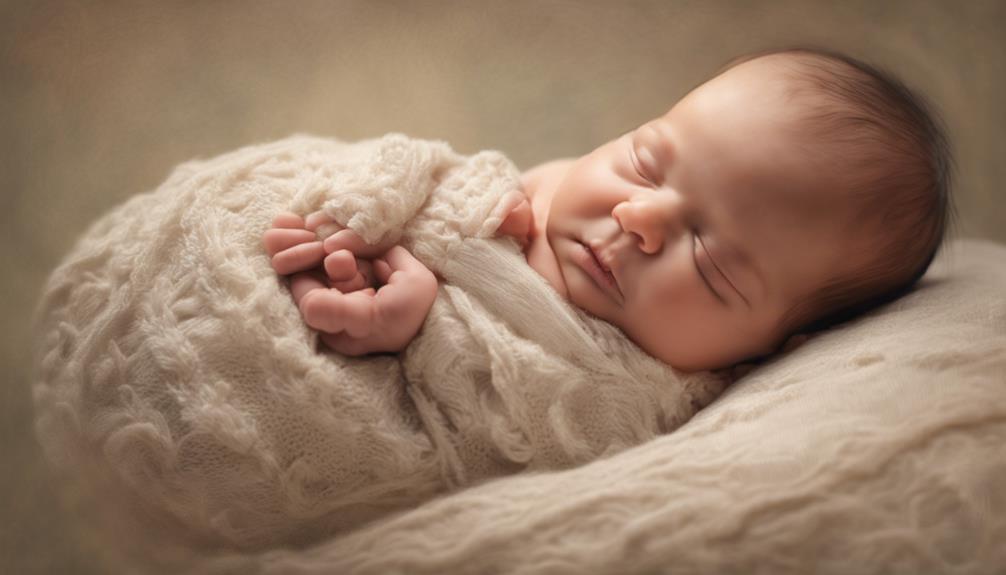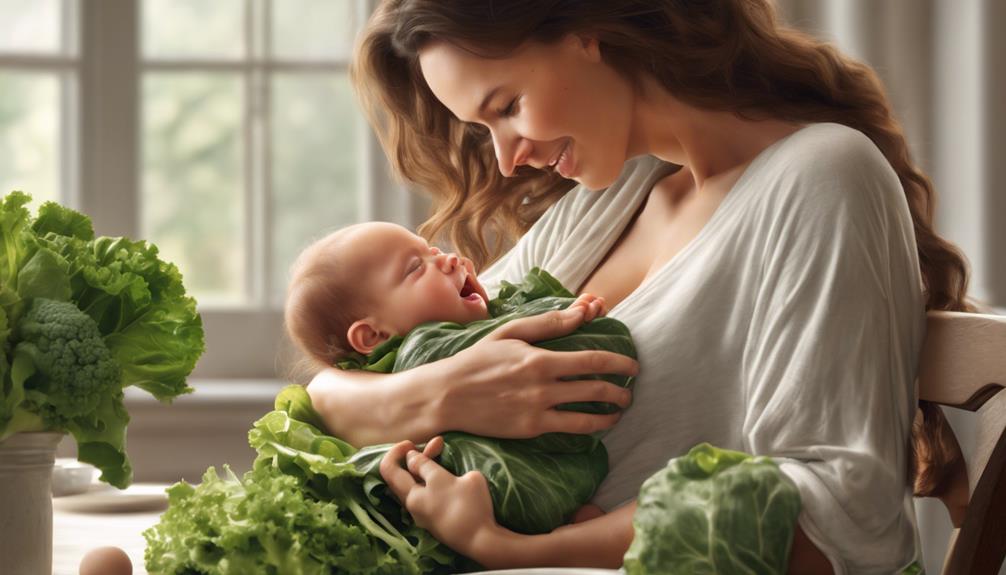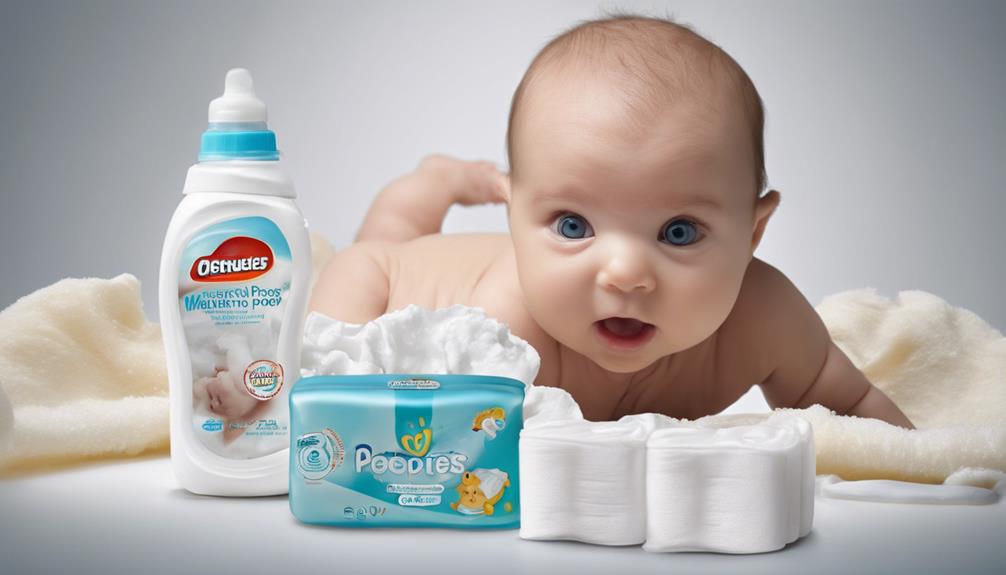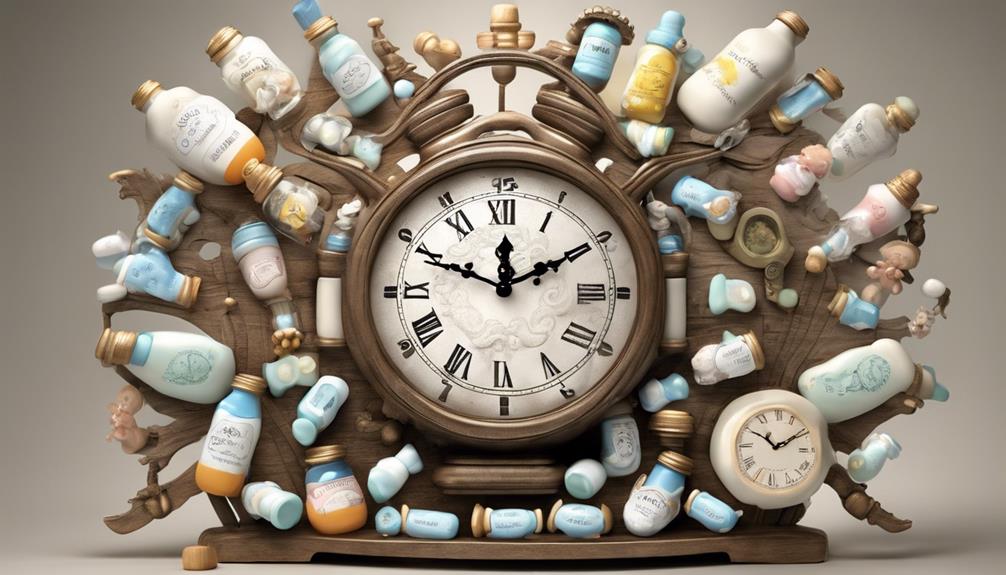Did you know that newborns tend to hiccup much more frequently than adults, with some babies experiencing hiccups multiple times a day?
If you're a new parent or caregiver, witnessing your little one struggling with hiccups can be concerning. Luckily, there are effective ways to help soothe and alleviate these hiccups, providing comfort to your baby.
By mastering a few simple techniques, you can ease your newborn's discomfort and create a calmer environment for both of you.
Key Takeaways
- Newborn hiccups are normal and indicate good health and development.
- Gentle techniques like back patting and pacifiers can help soothe hiccups.
- Natural remedies like burping during feedings can alleviate hiccups.
- Proper feeding positions and a calm environment can prevent and ease hiccups.
Understanding Newborn Hiccups
When your baby hiccups, it can be a surprising but normal occurrence that plays an important role in their early development. These adorable hiccups are triggered by the diaphragm causing rapid opening and closing of vocal cords, often happening during feeding or stressful events. Most newborns experience hiccups frequently, which actually indicates good health and development.
Hiccups are important for your baby's brain development and breathing coordination. They usually resolve on their own within 5-10 minutes, and thankfully, they typically don't interfere with your baby's eating or sleeping routines. To help manage and prevent hiccups, consider strategies like burping your baby during feeding and creating a calm environment during meal times.
Understanding the nature of hiccups in newborns can bring reassurance and a sense of normalcy to what might initially seem like a concerning issue. Embrace these hiccups as part of your baby's growth and development journey.
Gentle Techniques for Soothing Hiccups

To help ease your baby's hiccups, gently patting or rubbing their back can relax the diaphragm and provide comfort. Here are some gentle techniques you can use at home to help stop your baby's hiccups:
- Guarantee a pacifier: Providing a pacifier for your baby to suck on can help in stopping hiccups by regulating their breathing and swallowing patterns.
- Let hiccups run their course: Allowing hiccups to naturally subside within 5-10 minutes without intervention is often a simple and effective way to soothe your baby.
- Ensure a comfortable position: Keeping your baby in an upright position or holding them against your shoulder while gently patting their back can aid in relieving hiccups.
- Create a calming environment: Minimize distractions and noise to create a peaceful atmosphere that can help your baby relax during hiccups.
- Burping your baby: Guaranteeing your baby is properly burped after feeding can reduce the likelihood of hiccups by eliminating excess air in their stomach.
Natural Remedies for Hiccups
If your newborn is experiencing hiccups, there are natural remedies you can try to help alleviate this common occurrence. Burping your baby during feedings can release excess gas that may trigger hiccups. Using a pacifier can also relax the diaphragm and potentially stop hiccups naturally. It is generally effective to allow hiccups to resolve on their own within 5 to 10 minutes. While gripe water is commonly used for various purposes, it is recommended to avoid using it specifically for hiccups in infants unless there is clear clinical evidence supporting its use. Additionally, creating a calm feeding environment can help prevent and manage hiccups in newborns. Consider incorporating these natural remedies into your routine to ease your baby's discomfort.
| Natural Remedy | Description | Benefit |
|---|---|---|
| Burping | Releases excess gas during feedings, reducing the likelihood of hiccups. | Helps prevent hiccups. |
| Pacifier | Can relax the diaphragm and potentially stop hiccups naturally. | Aids in soothing hiccups. |
| Calming Environment | Creating a peaceful feeding environment can help manage and prevent hiccups in newborns. | Reduces triggers for hiccups. |
Tips for Preventing Hiccups

For preventing hiccups in newborns, make sure you burp the baby during and after feedings to release gas and reduce the likelihood of hiccups. When caring for your little one, here are some tips to help prevent those pesky hiccups:
- Maintain the Right Feeding Position: Feed your baby in an upright position to aid digestion and decrease the chances of hiccups.
- Utilize Proper Bottle Feeding Techniques: Make certain you're using the correct nipple size and feeding techniques to minimize air intake during bottle feeding.
- Focus on a Good Latch: During breastfeeding, guarantee your baby has a good latch to prevent swallowing excess air.
- Create a Calm Feeding Environment: Establish a calm and relaxed atmosphere during feedings to help your baby stay relaxed and reduce the likelihood of hiccups.
- Develop Proper Feeding Habits: Encourage proper feeding habits by allowing your baby to feed at a comfortable pace, which can help prevent hiccups.
When to Seek Medical Advice

If your newborn's hiccups persist for an extended period or if they seem uncomfortable, consulting a doctor is advised. While baby hiccups are generally harmless, prolonged hiccups can sometimes indicate an underlying issue. If the hiccups continue for many hours or if your baby appears to be in pain or distress, seeking medical advice is important.
Be cautious with home remedies and always consult a healthcare professional before trying any remedies for persistent hiccups. Remember, prolonged hiccups without signs of distress are usually not a cause for concern, but monitoring your baby's comfort level closely is necessary.
If your baby experiences prolonged hiccups accompanied by signs of distress or discomfort, such as difficulty breathing or unusual fussiness, seek immediate medical attention. Your baby's well-being is paramount, so don't hesitate to contact a healthcare provider if you have any concerns about your baby's hiccups.
Frequently Asked Questions
How Do You Comfort a Newborn With Hiccups?
When comforting a newborn with hiccups, gently burp them, change their position, or offer a pacifier. Engage in soothing activities like rocking or back rubbing. Create a quiet, peaceful environment to help them relax.
What Position Is Best for Newborn Hiccups?
When your newborn has hiccups, holding them upright is ideal. Elevating their head helps ease hiccups effectively. Placing them on your shoulder or in a reclined position can stop hiccups. Avoid laying them flat. Pat their back gently for comfort.
Is It OK to Leave Baby Lying Down With Hiccups?
It's perfectly safe to leave your baby lying down with hiccups. Hiccups are usually harmless and will go away on their own. You can carry on with your normal activities while your little one has hiccups.
What Are the Best Ways to Stop Baby Hiccups?
When you notice baby hiccups, try gentle burping or offering a pacifier. Let them pass naturally in 5-10 minutes. Avoid gripe water and stay calm. Seek medical advice if hiccups persist or worry you.
Conclusion
To sum up, soothing newborn hiccups is a common challenge for parents, but with gentle techniques and natural remedies, you can help your little one find relief. Keep in mind, hiccups are like tiny speed bumps in your baby's journey, easily managed with patience and care.
By understanding, soothing, and preventing hiccups, you can make certain your baby stays comfortable and happy. If hiccups persist or cause distress, don't hesitate to seek medical advice for peace of mind.









